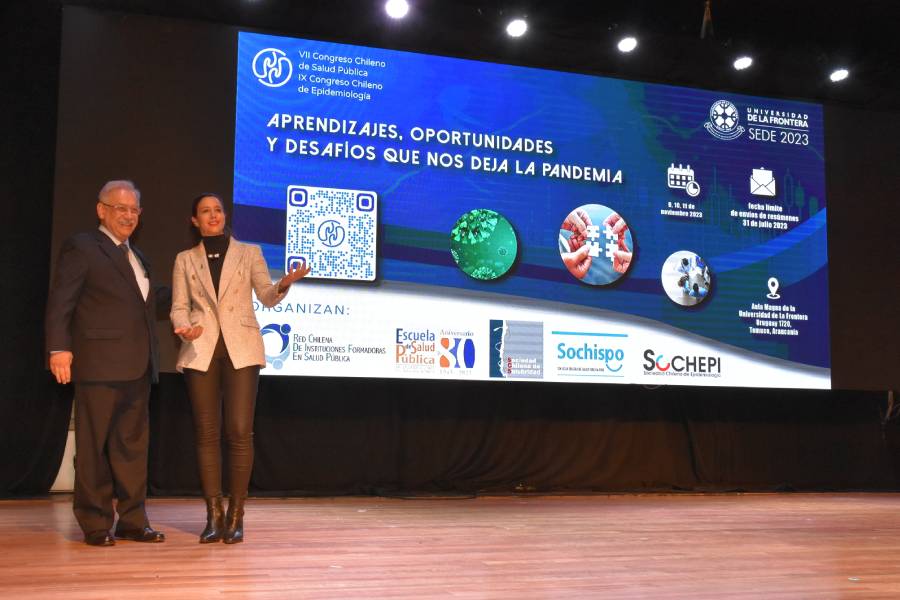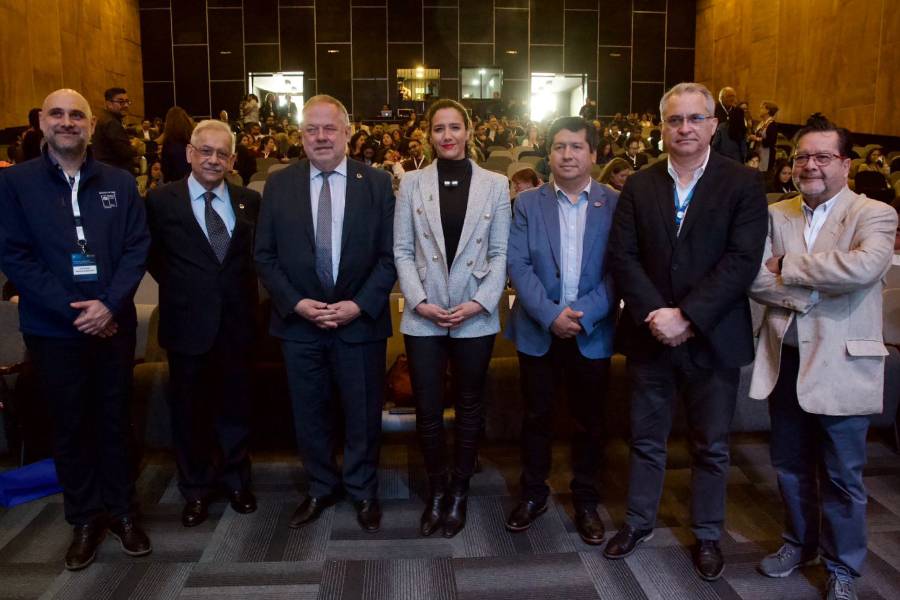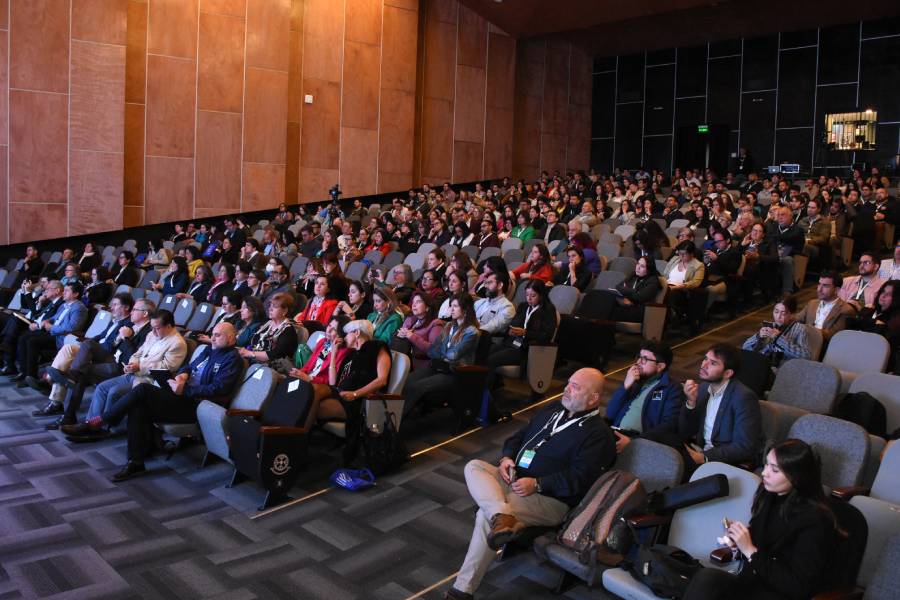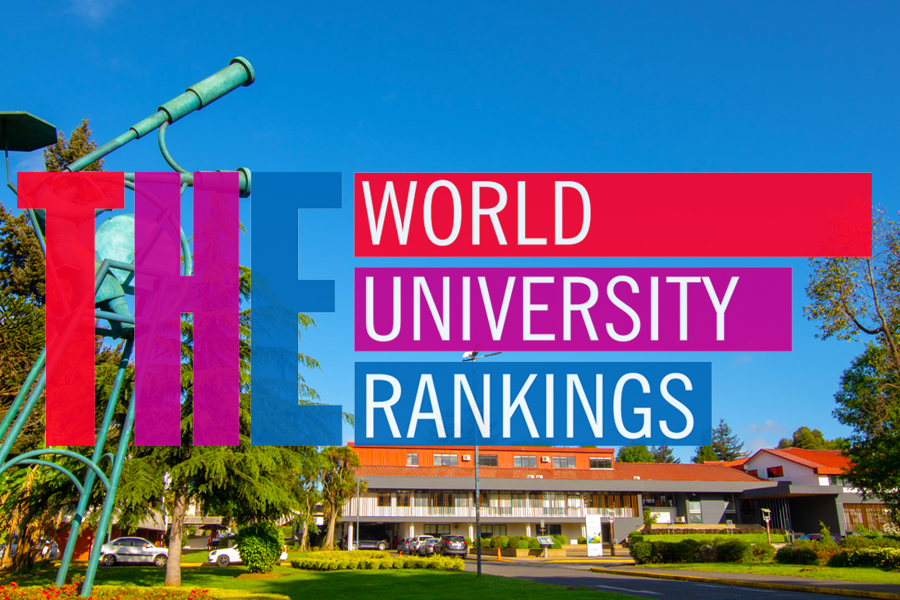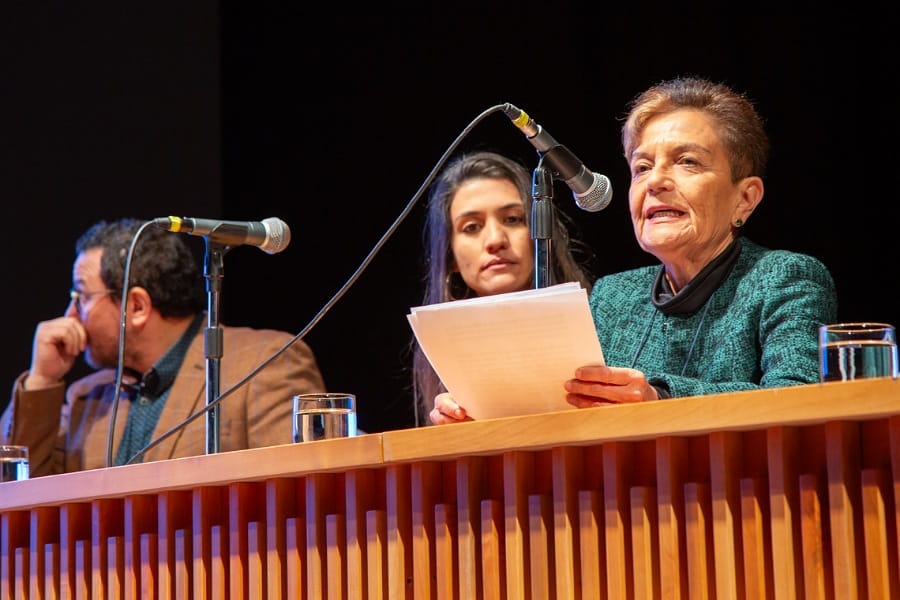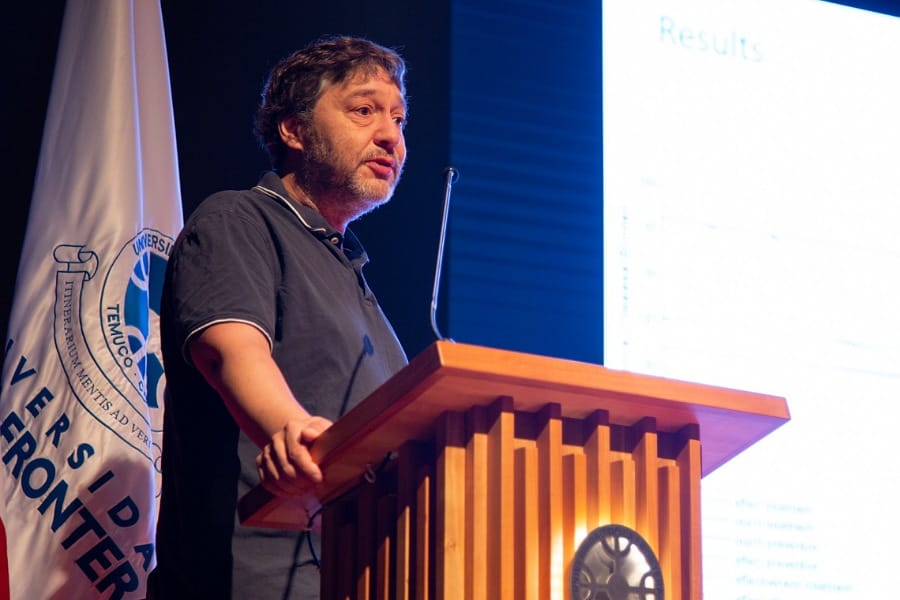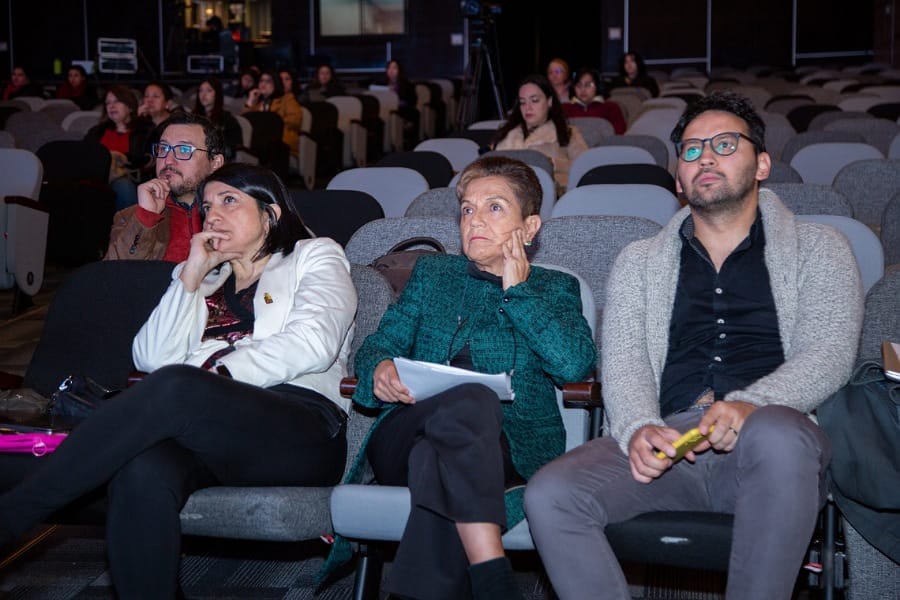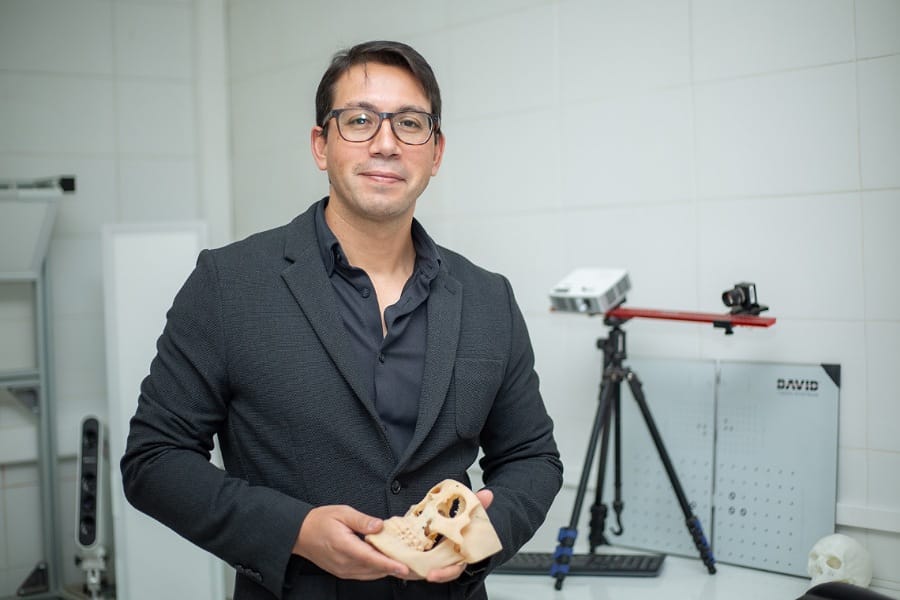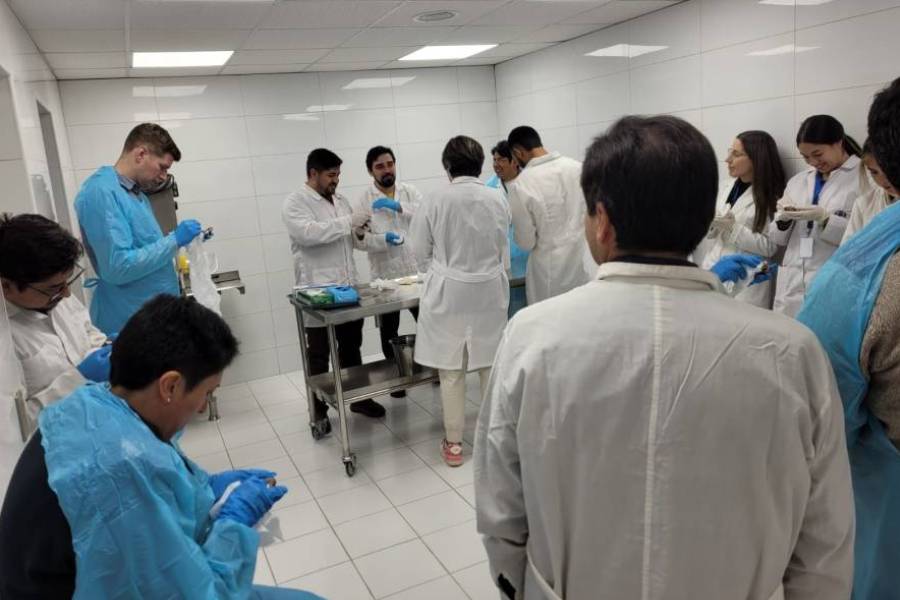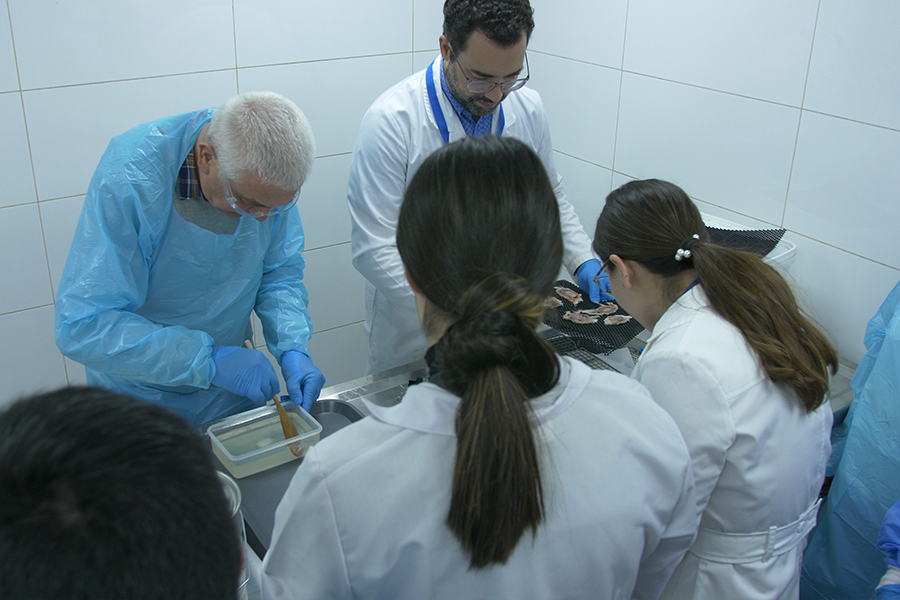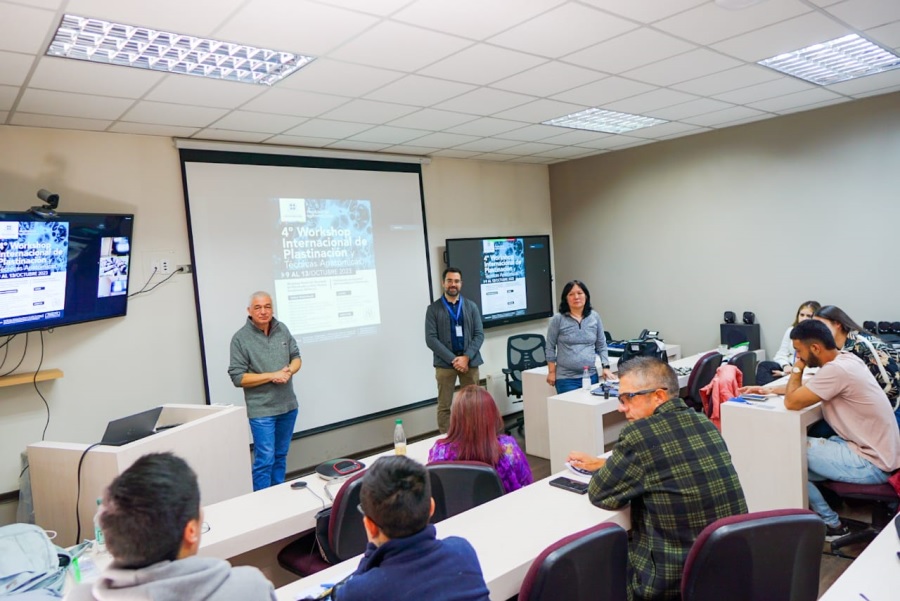|
Academics, students, health professionals and authorities came together at Universidad de La Frontera under the motto “Knowledge, opportunities and challenges left by the pandemic”. |
More than 500 health professionals met at the seventh Congress on Public Health and the ninth Congress on Epidemiology in the Aula Magna of Universidad de La Frontera (UFRO) to address the main health problems after the pandemic. Academics, students, health professionals and authorities came together under the motto “Knowledge, opportunities and challenges left by the pandemic” for the congress, which was inaugurated by Dr. Sergio Muñoz Navarro, the chair of the organising committee. “This is the Congress on Public Health that brought the most presented papers together, with 374 research papers, which makes us very happy and anxious. We are sure that it will be a complete success,” said Dr. Muñoz, academic of the Department of Public Health and the Centre of Training, Research and Management for Evidence-based Health (CIGES) of UFRO. The rector of the university, Dr. Eduardo Hebel Weiss, acknowledged the work of the health teams during the pandemic and emphasized the importance of participating together with other academics and health professionals in activities that address the new issues that have emerged after the COVID-19 pandemic. “This is the first time after the pandemic that we managed to bring together so many epidemiologists and health specialists to discuss the knowledge, opportunities and challenges the pandemic left us. This opportunity for dialogue should focus on everything that has been done to work towards the future,” Dr. Hebel explained. The keynote speaker at the event was Andrea Albagli Iruretagoyena, the Deputy Secretary of Public Health, who presented “Priorities of Government Management in Health”, where she addressed the government’s aim to reduce the drastic impacts of the pandemic, as well as the priorities of the ministry to work on health reforms to reduce delays, improve mental health care, reduce childhood obesity and increase the tobacco control measures. “COVID-19 is no longer a global health emergency, but that does not mean that it is no longer a challenge. The main goal of our agenda is to diminish the post-pandemic effects. The challenge for those who had to face the pandemic was to make a series of very difficult decisions, and now, we have to face a series of changes to diminish the post-pandemic effects,” Andrea Albagli explained. The congress took place from November 9 to November 11, with the symposia on “Civil society participation in pandemic control: epidemiology for decision-making”, “Challenges and opportunities of artificial intelligence applied to health” and “The tobacco epidemic in times of COVID-19: strategic, political and citizen analysis”; the presentation of research papers; and the closing conference by Dr. Ricardo Rozzi on “The interconnection between public health and protected areas: the ethics of cohabitation”, among others. Written by: Fabian Aguirre Silva, Faculty of Medicine |
|
Universidad de La Frontera is ranked in seven subjects of the prestigious international ranking and for the first time in the subject engineering. |
Times Higher Education (THE) released the results of the Rankings by Subject 2024, where Universidad de La Frontera (UFRO) is ranked in 7 out of 11 subjects, one more than in the previous version, entering the ranking for the subject Engineering for the first time. Clinical and health, life sciences, physical sciences, psychology, social sciences, education, and engineering are the subjects in which UFRO is ranked in this year’s version, which uses rigorous performance indicators that have been recalibrated to suit the individual fields. THE SUBJECTS The subject clinical & health ranks the best universities in the fields of medicine and dentistry, among others. This year, the ranking considered 1,059 universities in this subject, among which are five Chilean state universities, with Universidad de Chile and Universidad de La Frontera being the best two, in the 601-800 band. The subject life sciences highlights the leading universities in the fields of agriculture and forestry, biological sciences, veterinary science, and sport science, with 1,059 universities ranked in this subject, among which are six Chilean state universities, with Universidad de La Frontera being the best, in the 601-800 band. PHYSICAL SCIENCES AND SOCIAL SCIENCES The rankings by subject use the same performance indicators as the Times Higher Education World University Rankings 2024, although the methodology has been recalibrated to suit the individual fields. The ranking for physical sciences highlights the fields of mathematics and statistics, physics and astronomy, chemistry, geology, environmental sciences, and earth and marine sciences. This year, this category considered 1,370 universities, with seven Chilean state universities, where UFRO remains in the 1001+ band. The subject social sciences highlights the disciplines communication and media studies, politics and international studies, sociology and geography. This year, it includes 997 universities, with five Chilean state universities, among which UFRO is ranked in the 801+ band. PSYCHOLOGY AND EDUCATION The subject psychology ranks the leading universities in educational, sport, business, animal and clinical psychology, with UFRO in the 601+ band among 621 universities, including three Chilean state universities. The subject education considered 703 universities, of which six are Chilean state universities, with UFRO as the second best in the 601+ band. This subject ranking assesses the leading universities in the disciplines of education, teacher training, and academic studies in education. ENGINEERING This is the first year that UFRO is ranked in this subject, which highlights the best universities in the disciplines of general engineering, electrical and electronic engineering, mechanical and aerospace engineering, civil engineering, and chemical engineering. Out of 1,374 universities, UFRO is ranked in the 1001+ band, among other Chilean state universities.
Written and translated by: UFRO Communications Office
|
|
AThe seminar was organised by the International Network for Digital Mental Health Promotion and Development of the Millennium Institute for Research in Depression and Personality (MIDAP) and took place at the Aula Magna of Universidad de La Frontera, providing an opportunity for updating and knowledge exchange on digital mental health. |
The increasing number of remote medical consultations during the COVID-19 pandemic was the starting point to analyse the challenges and opportunities in the use of digital technologies to reduce the gaps in mental health care. The international seminar brought national and international experts together at the Aula Magna of Universidad de La Frontera (UFRO), in round table sessions, interventions, and various presentations. The seminar “Digital Mental Health: Challenges and Opportunities in Chile” was organised by the International Network for Digital Mental Health Promotion and Development of the Millennium Institute for Research in Depression and Personality (MIDAP), a project financed by the Chilean National Agency for Research and Development (ANID). “It is important to have access – between not having and having digital access, it is always better to have a certain mental health support. In the particular case of Chile, which is a large and narrow country, access is difficult. It is very important to consider this fact so that all people throughout the country can have access,” explained Markus Moessner, Ph.D. in Psychology and associate researcher at the Centre for Psychotherapy Research, University Hospital Heidelberg (Germany), who was in charge of opening the seminar. According to Ricardo Araya, psychiatrist and academic at King’s College London and director of the Centre for Global Mental Health, the experience shows that there are many difficulties in meeting the needs of the population in terms of mental health solutions. In this sense, the digital era and technology allow to move forward and to close the treatment gaps. “The pandemic left us some positive things: it forced us to think about mental health services in terms of delivering remote help since it was not possible to meet in person. It was a stimulus to rethink the digital era and to make progress with its development. Things that were questioned before are now normal, such as talking to a doctor through a screen, which was not very accepted before the pandemic, but now it is very current, feasible and many patients even prefer it,” added Ricardo Araya, who also won the National Prize for Applied Sciences and Technology in 2022. ROUND TABLE DISCUSSIONS “We are very pleased with this activity organised by MIDAP and UFRO. It is always good to invite top-level guests and to be able to share presentations of this type with our students and with professionals from our region. You always have to try to update your knowledge and in this case, we have the possibility to get together with professionals from several universities. It proves the potential of collaborative work on a problem such as mental health, which is very important to solve in Chile,” explained the UFRO-MIDAP researcher Dr. Manuel Ortiz. He pointed out that future research on digital mental health could study and analyse the reasons why people access remote care options more or less frequently. “Remote mental health care is a viable, effective alternative for people to access care. We have to consider that we have a lot of technology, which we are more familiar with and which eventually can make this easier when being well used by the people,” Dr. Manuel Ortiz concluded. Escrito por: UFRO Communications Office
|
|
The Technical Committee of the AO Foundation, an international non-profit organisation present in more than 100 countries and with more than 20 thousand surgeon members, selected Dr. Sergio Olate Morales and three other professionals to be part of the international committee on temporomandibular joint pathology and reconstruction. |
With a presence in more than 100 countries, more than 20 thousand surgeon members, and 65 years of experience, the AO Foundation appointed Dr. Sergio Olate Morales, associate professor of the Faculty of Dentistry of Universidad de La Frontera (UFRO), as one of the four members who will address temporomandibular joint (TMJ) pathology and reconstruction. The work will start on January 1st, 2024, and will last three years, with the potential to continue for three more years. It consists of the development of technologies and work management support that innovates the comprehensive care of patients with the particular pathologies addressed by the team of experts. “Personally, this was a surprise for me, but it shows that we are working adequately, in a serious and honest way, both in research and our clinical procedures. It is also a source of pride for me as an academic at Universidad de La Frontera and a maxillofacial surgeon in my region, at the public hospital of Lautaro. At our hospital, we perform high-level surgeries of high complexity, thanks to our very strong human, technical, and professional team we have built over at least ten years, working in the La Araucanía region,” Dr. Sergio Olate Morales commented. The AO Foundation (“Arbeitsgemeinschaft für Osteosynthesefragen”, shortened to the AO) is a non-profit organization and the premier innovator in the surgical treatment of bone fractures and disorders, with its headquarters in Devon, Switzerland. It was founded in 1958 by a group of surgeons who pioneered a new system of surgical fracture fixation that radically improved patients’ quality of life. Today, the AO Foundation has a global network of more than 520,000 healthcare professionals, offers more than 870 educational events worldwide annually, and has about 20,000 surgeon members, who work in the fields of trauma, spine, craniomaxillofacial, veterinary, and reconstructive surgery. “This nomination makes me very happy because this personal achievement is a reflection of what we do as a team. We are proving that it is possible to develop technology, innovation, and technology transfer of the highest level in the regions of a centralised country like Chile, with high ethical standards of care for our patients,” added Dr. Olate. The UFRO academic has been a member of the AO Foundation since 2010, and in 2021, he was admitted as a faculty member of the organisation in Chile. “This new task implies that I will have to travel to different places in Europe and America, developing technologies and supporting the management of our team’s work, all with a focus on how to improve the overall health of patients, particularly in temporomandibular joint pathology and reconstruction. It involves face-to-face work meetings in different parts of the world, probably in Europe, and also important international work relationships because we will be in contact with different teams in different parts of the world,” explained Dr. Olate. For this new task, Dr. Olate will be working in a team with three other international experts, with the support of the AO Foundation’s technical committee. Written by: Sergio Valenzuela, UFRO Communications Office |
|
The activity took place at Universidad de La Frontera, with the participation of outstanding speakers and experts in the field of plastination. |
For one week, eighteen academics, health experts, professionals and graduate students from nine countries participated in the 4th International Workshop on Plastination and Anatomical Techniques of Universidad de La Frontera (UFRO), organised by the Laboratory for Plastination and Anatomical Techniques of the Faculty of Dentistry and the Centre of Excellence in Morphological and Surgical Studies (CEMyQ). The workshop had a theoretical and a practical part, in which outstanding speakers in this field of knowledge, such as Dr. Telma Masuko from Universidad Federal de Bahía (Brazil), and Dr. Volker Schill, from Biodur, von Hagens Plastination GmbH (Germany), shared their knowledge, as well as Dr. Carlos Veuthey and the director of the Laboratory for Plastination and Anatomical Techniques, vice president of the International Society for Plastination, and director of the workshop, Dr. Nicolás Ottone from Universidad de La Frontera (Chile). In addition, the professor Dr. Carlos Baptista from the University of Toledo, Ohio (USA), participated online, as well as the president of the International Society for Plastination, Dr. Dmitry Starchik. According to Dr. Ottone, “the plastination technique makes it possible to preserve morphological, anatomical, human and animal structures in a biosecure way and for an indefinite period of time, for teaching, research and outreach purposes. We addressed this technique in the workshop, with theoretical classes in the morning and practical classes in the laboratory in the afternoon, for one week. The students developed all plastination techniques with silicone, epoxy and polyester resins, and micro-plastination to obtain ultra-thin slices”. The first version of this workshop took place in 2017, after the implementation of the Laboratory for Plastination and Anatomical Techniques at UFRO. Since then, they organized four hands-on workshops, a certified course, and the 20th International Conference on Plastination. “This shows that our work is internationally recognised, not only in terms of preparing plastinated material for teaching purposes but also regarding our research, with more than twenty WoS publications in the field of plastination so far. Currently, I am also the vice president of the International Society for Plastination, where I was the secretary before. That also gives UFRO great visibility at the international level,” Dr. Ottone pointed out. PARTICIPANTS The participants came from Canada, the United States, Mexico, El Salvador, Colombia, Ecuador, Bolivia, Uruguay, and Chile this year. The Director of the Pathologists’ Assistant Program in the School of Health Professions at the University of Texas Medical Branch (UTMB), USA, Dr. Marcela Lizarraga, emphasised the quality of the workshop and the importance of this technique for teaching and research. “Plastination lasts forever. We still do cadaver dissection, but that lasts only a semester or a year. After that, we have to return the bodies because they are cremated. In turn, with this plastination technique, we can have specimens that last forever. In addition, the students can handle them without special precautions, because the technique does not require any toxic or chemical substances,” she explained. She was also pleased with the format of the workshop. “It is really good. I have the chance to ask questions about things I do not know. We are just starting with our laboratory, so I have many questions. Besides, here are experts for each phase of the process, so I can learn everything I need to get started,” she commented. It is worth mentioning that this International Workshop, organised by Universidad de La Frontera, is the only training programme for plastination and anatomical techniques in South America. Written by: Soledad Millapan Sandoval |





